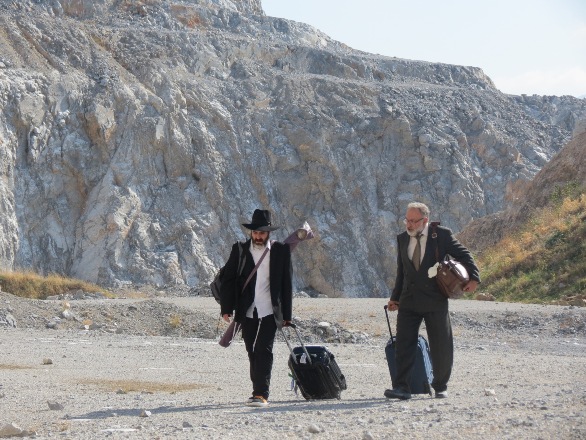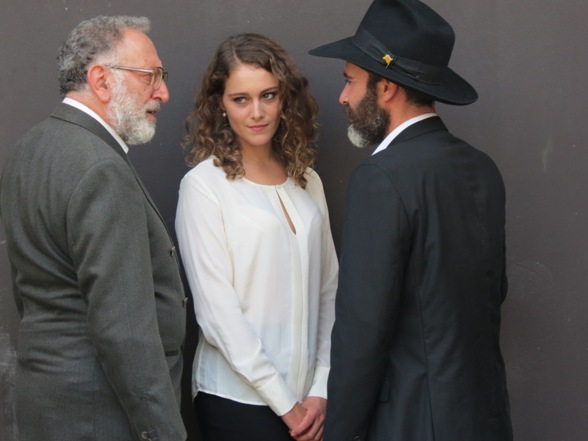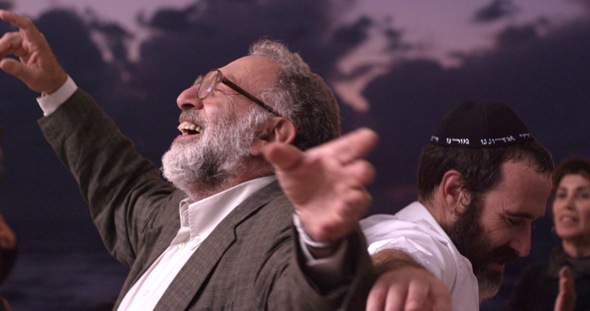Avraham Kofines, the curmudgeonly presence at the centre of Magic Men, has reached that point when it is time to put one’s affairs in order. As a teenager in Greece, he had been rescued from the Shoah through the kindness of another, a professional magician. 60 years on, he has the opportunity to return to Greece for the first time since his teenage years. It’s time, at last, to track down the by now elderly magician who saved his life.
If only things were so straightforward.
Magic Men is one of those odd films which seem quite comfortable to travel amidst the tropes of others that have gone before them. The first pointer here is that the recently-widowed Kofines is to be accompanied to Greece by his estranged son Yehuda, a Hasid and a rapper anxiously awaiting news about the gender of his fourth child. He is hoping for a boy, you see. Given that Kofines was not told that he will be coming along, and that the last time they met – at the funeral of their wife and mother – there was a clash of sensibilities, it doesn’t take very much to figure out that there may be troubles ahead.

Magic Men continues along a predictable arc of cliché. Kofines, at sea in the alien landscape of Thessaloniki that was once home, strikes up a friendship and an alliance with a friendly whore. (No, I don’t really like the word either. But since we are playing with stereotypes here…). Naturally, she has a heart of gold. And an angelic child in tow. There is a journey (isn’t there always?) which forces father and son to at least try to understand one another. The useful intervention of the Shabbat forces them to pause and take stock. (Think about it. You are observant and you set out on a predictably long journey with the Shabbat hovering on the horizon? Please.) And so on.
It is not that Magic Men, up to this point, is a bad film, because it isn’t. Directors Guy Nattiv and Erez Tadmor conjure up an easy fluency, a lucidly authentic script shored up by un-self-consciously artistic cinematography. It’s just that one gets the sense that we’ve seen this all before, even if in a different setting. Yes, I know there are only seven stories and so on and so forth, but a bit of variety beyond the superficial never goes astray.

At times, Nattiv and Tadmor don’t do themselves any favours either. The rabid irrationality of racism will never be a cliché; It will be difficult to make a film set in contemporary Greece without at least referencing the rise of the hard Right, and all that this has brought in its wake. Still, the moment of reflection about contemporary anti-Semitism that they reference feels a bit forced, even if it hadn’t been transposed almost directly from Strangers, an award-winning short the directors made a decade ago.
But.
All these reservations aside, Magic Men warms up through some authentic screen enchantment, the combination of sound characterisation and convincing chemistry between the principals leading us to a film with real heart. Ariane Labed as Maria, the prostitute, is understated yet engaging. One senses real steel beneath her sunny demeanour. You expect this, of course – if you are forced to hang around hotel lobbies for a living, you need this for self preservation – but still, she carries it off well. Zohar Strauss, as Yehuda, is both charming and conflicted. It is especially nice to see non-stereotypical depiction of social minorities – in this case, the ultra-orthodox who has submitted himself to God’s ineffable will. His problems are things that we are all familiar with, in one form or another; Strauss’s subtlety as Yehuda is a nice reminder that as humans, we have more in common than what separates us.

But Magic Men is made by yet another peerless performance by Makram Khoury, as the elderly and somewhat irascible Kofines. Beneath his bluster, Kofines embodies real sorrow, fear, anxiety, and in a roundabout and unexpected way, hope. Things can become better. The role becomes real and believable thanks to Khoury, in his second role worthy of note this year (after Sweets). I’ll pay to watch him reading a telephone directory (remember those?). And, despite its weaknesses, Magic Men is much more than that.
Magic Men (2013)
Directed by Guy Nattiv and Erez Tadmor
Starring Makram Khoury, Zohar Strauss, Ariane Labed
100 minutes, Hebrew/English/Greek w. Hebrew and English subtitles.





